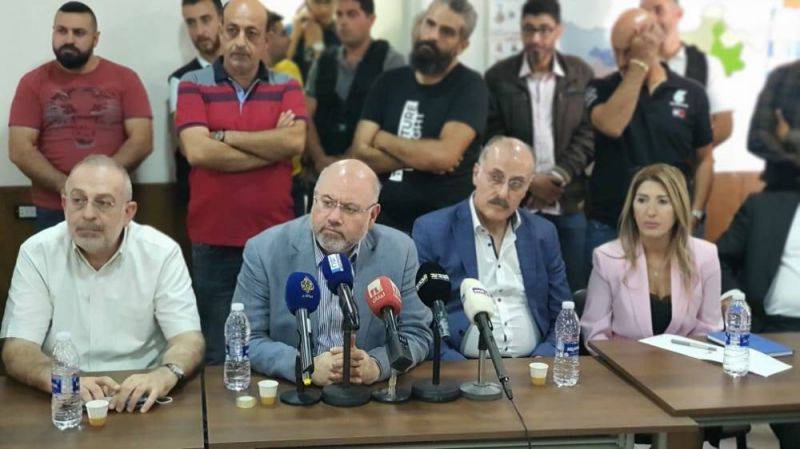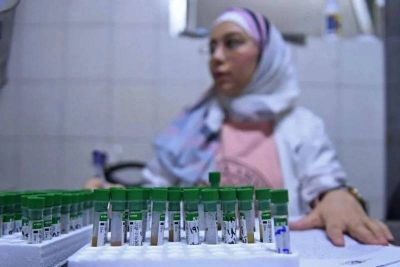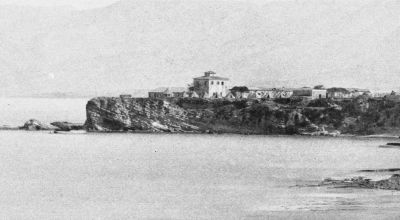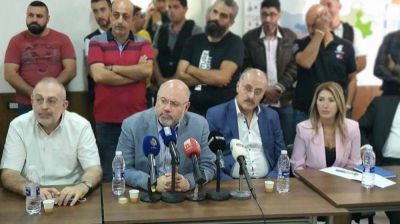
Health Minister Firas Abiad gives a press conference during a visit to North Lebanon on Oct. 9, 2022. (Courtesy of Michel Hallak)
BEIRUT — Caretaker Health Minister Firas Abiad on Wednesday cast concern over the cholera outbreak in Lebanon, noting a "fast spread of the disease," and adding that despite the fact that most cases have been "among the [Syrian] refugees," there has been "an increase in the cases among the Lebanese."
In a press conference, the minister announced that Lebanon has recorded two more cholera deaths raising the toll to five deaths. Lebanon has also recorded 80 new cases in the last 48 hours, raising the toll to 169 confirmed cholera cases since the beginning of the outbreak, the Head of the Health Ministry's Department of Preventive Medicine Atika Berri told L'Orient Today.
Contaminated crops in the north
The minister indicated that upon a closer investigation, most of the death cases are attributed to the fact that they did not receive medical care, inviting those who feel ill and suspect contracting cholera to go to the hospital. Abiad added that the ministry was able to detect contamination in a body of water that has been used to water crops in the north, noting that this has been aiding the water-borne disease spread.
Abiad had inspected the water treatment plant in Tripoli on Oct. 9, during a visit, when he stressed the importance of securing a consistent power supply for the plant so that it can provide residents with water, "otherwise, citizens will have to search for other unsecured sources." Tripoli's Water Authority's plant "has the ability to secure safe drinking water for Tripoli and the northern regions," but that doing so is contingent on the plant receiving electricity, he had added.
On Wednesday, Abiad reiterated that the water treatment plants in the north haven't been receiving sufficient power supply, which endangers the water quality and helps the disease spread. He noted frequent power cuts at water pumping stations, noting that “the water that remains in the pipes becomes polluted after a while."
The Health Ministry "was able to secure sufficient quantities of chlorine that will be distributed," Abiad continued, indicating that the ministry is "working on preparing a field hospital in Arsal, while there are eight field hospitals ready for the distribution of medical supplies."
UNICEF to the rescue
On Oct. 6, Lebanon’s first cholera outbreak in nearly three decades spread in rural areas in the north of the country, raising concerns about the possibility of the disease reaching more people or, even worse, overwhelming the already collapsed public health system.
In a report published Monday, the United Nations Children's Fund (UNICEF) said that part of its cholera response task force's mission in Lebanon will include procuring and distributing "bleach, hand sanitizer, liquid soap, and water purification tablets for 1,731 public schools (primary first and second shifts), secondary schools, and Technical and Vocational Educational Training (TVET) [institutions] as well as 361 private free schools."
UNICEF also added that since Oct. 8, the organization "has distributed 80,000 liters of fuel to water pumping stations and wastewater treatment stations in locations with confirmed and suspected cholera cases; procured emergency medical supplies to treat cholera — including 150,000 Oral Rehydration Salts and 50 Cholera treatment kits," which "will support treatment of 5,000 cholera cases and symptoms including moderate to severe diarrhea," and "trained 900 frontline workers and partners on cholera awareness including transmission, symptoms, treatment, prevention, FAQs, and referral mechanisms."
According to the most recent World Health Organization count, the cases in Lebanon come after more than 13,000 reported cholera cases and 60 deaths in neighboring Syria since August. According to experts on the country’s water infrastructure, Lebanon’s general household water supply is at a lower risk than contaminated fruits and vegetables, and there are safeguards in place that reduce the chances of contamination of the residential water supply.


